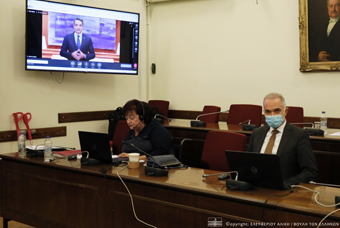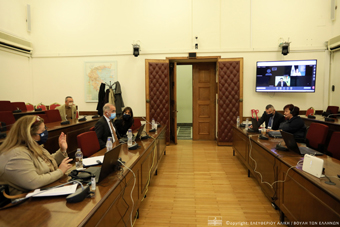Press Office
Athens, 18 November 2020
Opening session of 66th Annual Session of NATO Parliamentary Assembly

The priorities for the next decade, NATO 2030, will be at the heart of the discussions during the 66th Annual Session of the NATO Parliamentary Assembly (NATO PA), which kicked off today, online, due to the pandemic and will conclude on Monday, 23 November 2020. This significant event would have taken place under normal circumstances in Athens, with hundreds of participants, parliamentary representatives from all member states of the Organization.
The President of the NATO PA, Mr. Attila Mesterhazy, opened the Session and underlined the extraordinary conditions under which the Session is taking place due to the unprecedented global healthcare crisis, but also due to the increased challenges that the Parliamentary Assembly is called upon to address, taking into account the common good of the Alliance.
Following that, the Head of the Greek delegation, Mrs. Marietta Giannakou, also greeted the participants and introduced the Head of the Greek Government, Mr. Kyriakos Mitsotakis, who addressed the Assembly.
Mrs Giannakou referred to the importance of the Parliamentary Assembly, pointing out that “parliaments are the cornerstone of the modern-day representative systems and as such provide governments with the necessary legitimacy both in the interior and internationally”. She underlined that “the NATO PA provides MPs with the opportunity to hold discussions and to influence the decisions made in the sphere of defence and security in the Alliance, while at the same time, we are given the opportunity to work to strengthen and to promote Euro-Atlantic relations”. Mrs Giannakou stressed that “thanks to parliamentary diplomacy within the Assembly, the NATO values of democracy, partnerships, solidarity and cooperation are strengthened and disseminated”.
In the framework of the discussion on setting NATO priorities for the next decade, the Head of the Greek delegation underlined that “since its inception, NATO members have forged strong ties based on respect for liberal democracy, the rule of law and the commitment to peace”, stressing that “in order not to lose sight of that, three important conditions need to be met: first, we need a good reading of current and upcoming challenges, second, NATO must strengthen its social legitimacy, and third, the cornerstone, the principle of Solidarity, which puts the effectiveness, the unity and the prestige of the Alliance to the test”.
In his statement, Prime Minister Kyriakos Mitsotakis stressed that “for the last 65 years the NATO PA has been critical to the strengthening of our Atlantic Alliance”, mentioning that himself, he had been a member of the Assembly for 8 years and could attest to its importance.

Addressing the members of the Alliance and the NATO leadership, Mr. Mitsotakis touched upon the fact that member states gain strength from the unity of their values and from the security of their shared defence guarantee. He then added, that this guarantee should be underpinned by the genuine commitment of all member states and that “allies cannot afford to disregard the geopolitical implications of their policies and actions, in particular when these have a direct effect on the Alliance's overall security and cohesion”.
As the Prime Minister emphasized, “allies cannot cooperate with jihadist groups nor can they deploy S-400 missiles. Such practices undermine NATO's values and reduce its solidarity, cohesion, unity and effectiveness as a political-military Organization and they are at odds with the objectives of the Alliance itself and its defence interests”.
Mr. Mitsotakis referred to the role of Greece which “sits at the apex of the Eastern Mediterranean and North Africa”, a region “of huge strategic importance to NATO, and of course to the EU”.
With reference to the ongoing Turkish provocations, the Prime Minister outlined the situation by saying: “While being a security provider, Greece itself has been facing security challenges, which undermine NATO's unity. In 2020 that unity has been severely tested, due to Turkey's provocations and unilateral actions. In March we were faced with the weaponization of migratory flows; in summer, we had to set our armed forces on high alert, because of actions against our sovereignty and sovereign rights over our seas. Eventually, two allied naval forces were facing each other for 35 days, a situation endangering our security and the stability of NATO's southern flank.”
Mr. Mitsotakis reiterated his commitment to good faith dialogue with Turkey, provided there is reciprocity and warned that “however, if our calls remain unanswered, it will become inevitable for the EU to take measures to protect its strategic interests and those of its member states.”
Thereupon, the Minister of Environment and Energy, Mr. Kostis Hatzidakis, representing the government, answered questions by participating lawmakers from the member states and partners of the Alliance.
High resolution images
Related files
Back